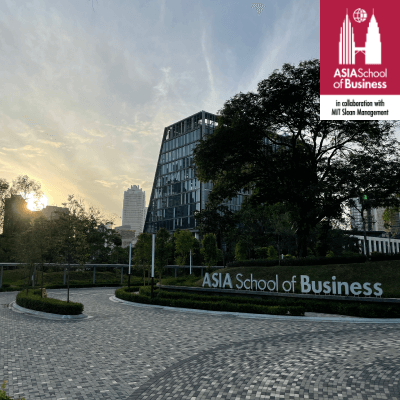- About

Established in 2015 in collaboration with MIT Sloan Management, our vision is to be a global knowledge hub, with regional insights from Asia and the emerging world.
- Faculty & Research

ASB’s research centers conduct impactful research in emerging markets, business strategies, technology, and sustainability. Together, they foster innovation in the business landscape.
- Academics

The ASB curriculum seamlessly integrates MIT Sloan’s rigor with the strategic insights of Asia. With MIT Sloan Immersion and Industry Treks, it immerses future leaders in a diverse range of industries.
- Micro-credentials

Introducing ACE (Agile Continuous Education), a structured micro-credentials initiative offering flexible, hybrid courses developed to strengthen professional capability in a rapidly evolving landscape.
- Executive Education
- Corporate

ASB excels through dynamic collaborations, addressing business challenges with innovation, built on robust partnerships.
- Alumni
The Future Managing of the Workplace and People
The Future Managing of the Workplace and People
February 27, 2023
Date
9:00 AM – 5:00 PM
Time
RM 2,500*
Program Fee
N/A
Format
Overview
A trifecta of factors is deeply affecting where and how we work and our views on work itself: 1) the Covid trauma, 2) the acceleration of digital transformation, and 3) shifting personal priorities of employees.
While a “me-and-the office” reframing is occurring among employees of all ages, it is particularly pronounced among Gen Y and Z – the very employees on whom we will be counting to lead our companies in the future.
For companies, the above is of enormous significance. How will we be able to manage and motivate people when the very notion of the “workplace” continues to mutate? What adaptations to “performance management” will be required? Will how we pay and incentivize people also need revision? And how will the HR function and HR professionals need to adapt to remain effective in this context?
This interactive program will tackle the above and other critical issues companies are facing as they “futureproof” for managing talent. This includes looking also at topics such as employee wellbeing, psychological safety and the expectations arising out of the sustainability movement (ESG).
For example, how will a company redefine its “employer brand” as ESG factors take on more weight? And, in terms of talent, how will Asian and other companies respond to the call for more inclusive and diverse workplaces (D&I)? What about DEI? Beyond recruitment practices, what else may require new approaches?

- Current and future “markers” affecting how we think about and manage work and talent
- ESG – fad or transformational phenomenon?
- Rethinking performance management and incentivization in the context of sustainability
- Case study presentations and learnings
- HR, Reward and Compensation, talent management and other such managers
- Board members, CEOs, and others who supervise the above professionals
- Those interested in the multiple dimensions of managing a workplace and its people in the postCovid period and beyond.

Gabe Shawn Varges
Adjunct Senior Lecturer
Faculty Profile
Gabe Shawn Varges is the Senior Partner, HCM International, and Chairman of the GECN Group, Switzerland and an Adjunct Senior Lecturer at the Asia School of Business.
Mr. Varges has extensive international experience as an executive, regulator, academic, and advisor. He works with companies and authorities around the world on the interconnection of strategy, corporate governance, board effectiveness, leadership, culture, ethics, compliance, ESG, performance management, compensation, and regulation.
In addition to his private sector and academic work, Mr. Varges’ experience includes serving as Head of Governance of the Swiss combined banking, securities, and insurance regulator. There, among other things, he supervised financial institutions and represented the authority on various international bodies, including the OECD, BCBS, IAIS, and the Financial Stability Board, leading or contributing to various cross-border expert taskforces among regulators. Earlier, he served in senior executive positions with major multinationals.
Mr. Varges has served on various boards and is currently Chairman of Ethics & Compliance Switzerland. An author of multiple publications, Mr. Varges has taught at several universities. He is a Juris Doctor graduate of Harvard and holds BA and MALD degrees. At Harvard, he served as Teaching Fellow and Tutor, and was part of the Harvard Negotiation Project.
Connect with us to start
The Future Managing of the Workplace and People
RM 2,500*

RM2,500.00
Program Fee